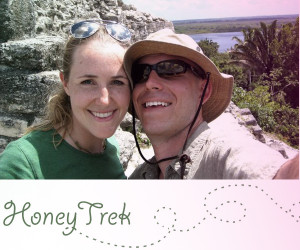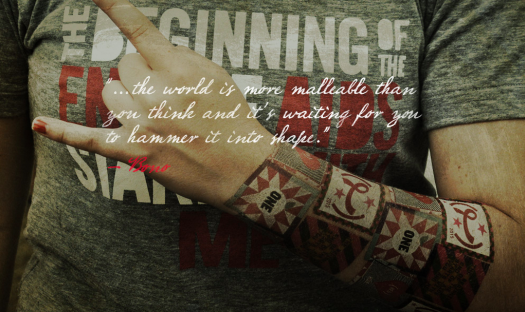Newlyweds Embark On HoneyTrek To See The World
A 500-day expedition through the lush jungles, mountain peaks, and turquoise waters of 25 countries. Sound like heaven? That pretty much sums up what I envision utopia to be. This is the real-life story of two newlyweds, Mike and Anne Howard, who cast off convention and expectations and embarked on journey to see the world. They have captured the sights, sounds, tastes, and discoveries on their blog HoneyTrek.
Cara Murphy: How did you decide on a 500-day honeymoon to 25 countries? What sparked the idea?
Anne Howard: Friends of ours told us they were considering taking a trip around the world for their honeymoon and the concept floored us. Leaving jobs, friends, and all security sounded like such a scary idea, but exploring the globe while we’re young and celebrating our marriage with such an extraordinary journey captivated us. Most people wait until they’ve retired to travel big, but we think life is short and you’re only young once (two cliches worthy of their overuse). That motivated us to crack the nest egg now, making an impact on our lives and hopefully others along the way.
CM: What are your travel essentials?
AH: Our top three would be:
1. Our SteriPEN water purifier. Instead of buying bottled water everyday (which is terrible for the environment and your wallet over the course of a long-term journey), we use this portable UV light to purify our water on a daily basis – wherever we are: be it at a hotel, bus station or a river stream.
STAT: Assuming two 1-liter bottles of water at $.75 a liter per day per person over 280 days; To date we have saved approx 1,114 plastic bottles from potentially reaching a riverbed or ocean (minus six we were pigeon-holed to purchase) and put $835 back in our travel budget, thanks to this ingenious invention.
2. iPhone. We actually don’t use it as a phone considering we gave up a phone plan ten months ago, but we love it for its innumerable travel tools: GPS, a flashlight, notepad, document scanner, juke box, alarm clock, currency converter, foreign language dictionaries, New York Times, Skype, etc…all in addition to the standard benefits of the Internet, email reader, and social media apps.
3. A lightweight, dark-colored, nylon duffel bag. We almost just brought our 60-liter backpacks, but as it turns out, our duffels have become our primary luggage. Whether we a reviewing a luxury hotel for Honeymoons.com or being crammed into an oversold mini-bus…the duffel’s sleeker profile allows for tons of flexibility.
CM: What is the most surprising discovery you have made so far?
AH: How few Americans are out on the road. Traveling through South America, Africa, and Asia, we meet Germans, Australians, French, and English all the time…but Americans? Rarely. We can’t explain this phenomenon – maybe it’s that sabbaticals and “gap years” aren’t a common concept in the States, but no matter the reason, we hope more Americans can make the time to experience the world outside the West.
CM: What cause/charities are you most passionate about? Why?
AH: If there is one issue that we feel is at the root of nearly every environmental and humanitarian issue worldwide, it would undoubtedly be overpopulation. From clean water to deforestation, over-fishing to ozone depletion, species extinction to the rapid spread of diseases, the majority of problems facing the world right now can be attributed to the stress population growth puts on the planet and its people. Layer in the rapidly expanding middle class in countries like India and China, consuming more resources than ever-before, and we are approaching the edge of the environmental cliff. The real kicker is that few speak out about the severity of this problem because it’s such a political and religious land-mine. However, one organization making great strides in in population stabilization is PopulationConnection.org with extensive initiatives to educate young people about unsustainable population growth and their work with the government to inform family planning policy and funding.
CM: You are an ambassador for Muskoka Foundation, a group that helps connect travelers with volunteering opportunities along their path. What is this experience like?
AH: There is quote by E.B. White that largely encapsulates our travel experience and also our relationship with Muskoka: “I arise in the morning torn between a desire to change the world and a desire to enjoy the world. This makes it very hard to plan each day.” In trying to make it all the way around the world and make a positive impact while we go, we realized our efforts would be best spent as charity scouts. Instead of just moonlighting at an orphanage or shelter for a couple days (we usually aren’t in one place more than three or four days), we use our time traveling through the hundreds of regions we are visiting to pinpoint incredible NGOs that could be great fit for the Muskoka volunteer network. If we encounter an incredible cause, like the Africa Yoga Project, that gives troubled East African youths this empowering and restorative outlet, then we try and put it on Muskoka’s radar for future volunteers. Alternatively, if Muskoka hears of a wonderful organization but they can’t get out there to scout it, like the Maya Foundation in a remote region of Nepal, then we make our best effort to visit the organization, hear their story, meet they people they are helping, and find out if there is a way for travelers to make a difference.
CM: What is one tip or lesson you would like to share with someone who wants to embark on a travel adventure?
AH: Don’t let the planning process bog you down, just pick a starting point and go. We booked our first night’s lodging on our trip from the runway of JFK airport and didn’t even know the town we were headed to after that. There will always be places to sleep, food to eat, and things to see. If you leave wiggle room in your plans, your gut, local advice, and happenstance will guide you towards the most amazing and life-changing adventure.
Learn more about Honey Trek.
Connect via Facebook (Mike & Anne’s- HoneyTrek.com) and Twitter (@HoneyTrek).



